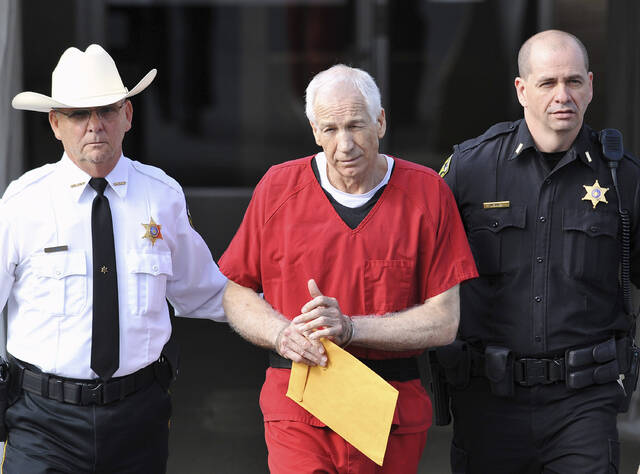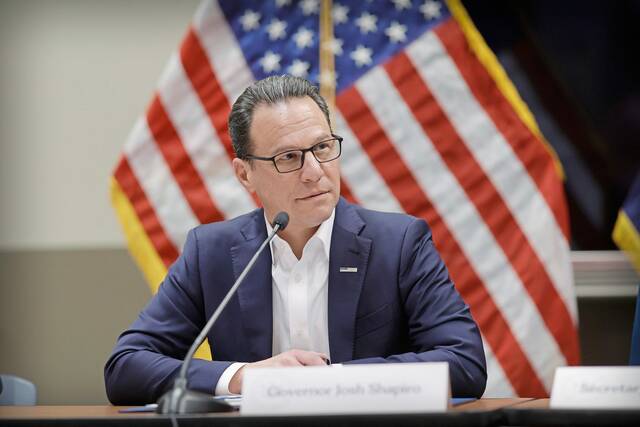In a new appeal, convicted child molester Jerry Sandusky alleges the lead prosecutors in his case gained financially from a post-conviction relationship with one of the eight victims who testified at trial.
The once-lionized Penn State football coach also presents a sworn statement from a second victim who, according to the document, is now disavowing his June 2021 trial testimony that Sandusky sexually abused him.
Those two developments pop off the pages of an 84-page motion at the heart of Sandusky’s latest bid to overturn his conviction and, at minimum, win a new trial.
All prior appeals have been unsuccessful.
In a case that drew heavy national attention and, fairly or unfairly, shook the foundations of the Joe Paterno era at Penn State, Sandusky, now 81, was convicted of the serial sexual abuse of up to 10 boys involved in his now-defunct youth charity, Second Mile, between 1994 and 2008.
That includes two victims prosecutors have they were never able to identify, but whose circumstances were testified to by third-party witnesses.
Sandusky, who coached alongside Paterno for 31 seasons, is now 13 years into his minimum 30-year state prison sentence.
The motion, filed this week in Centre County by a team of attorneys with the Tucker Arensberg law firm, is the latest chapter in Sandusky’s crusade to clear his name.
His team is also asking the court to reconsider evidence that one of the 12 jurors was separately interviewed by a team hired by Penn State trustees to conduct an internal investigation of the circumstances surrounding the Sandusky allegations.
The Freeh Group was doing its work for the trustees concurrent with the Attorney General’s preparation for trial in 2012-13.
Sandusky’s trial attorney Joseph Amendola knew about the Freeh Group interview and asked the woman — a tenured professor at the time — about it during her screening for jury service, according to case records.
But, the new appeal asserts, Amendola didn’t have enough information to fully vet the issue and understand the woman’s expressed biases against Penn State leadership. At a result, the defense argues, Sandusky was unfairly denied the opportunity to disqualify her.
The latest appeal is a post-conviction relief motion, which allows any convicted defendant to seek a new trial if he can show new evidence that might have changed the outcome of his trial had jurors been made aware of it.
Much of document goes over familiar ground - that the victims presented in Sandusky’s case were motivated by the prospect of large civil settlements and allowed themselves to be coached by police, counselors and civil attorneys to stack stories that painted Sandusky — once one of legendary Penn State head coach Joe Paterno’s top lieutenants — as a master groomer and serial predator.
That theory has been argued several times before, including at the original criminal trial, though in the latest filing the defense team asserts it has additional evidence this time around.
But there is new material as well.
A question of trust
Some of the most salacious new information is the documentation that trial prosecutors Joe McGettigan and Frank Fina helped connect one of the victims, identified at trial as Victim 9, to a civil attorney with McAndrews Law before the trial began.
Victim 9, like other victims in the case, eventually filed a civil claim but through a different law firm. (He is not being identified here in keeping with PennLive’s confidentiality policy to protect sex crimes victims who have not agreed to identify themselves.)
But McGettigan joined McAndrews Law one year after the trial. And once Victim 9 received his $20 million settlement from Penn State, the McAndrews firm was hired to establish a trust fund governing distribution of the settlement funds.
Fina and a woman the appeal identifies as McGettigan’s paramour, Gay Warren, were then named to two of three seats on a trust advisory committee that held great sway over the application of those rules.
According to trust documents attached to the motion, the advisory committee positions were paid $5,000 per year, plus a “reasonable” hourly rate for time spent on their related duties.
The settlement and trust agreement were entered into in April 2015, nearly three full years after McGettigan and Fina led Sandusky’s prosecution.
Both men had moved to private practice by that point.
But Sandusky’s team said it adds a deeper layer to the type of witness coaching and collusion that they argue infected the case from the start.
“This arrangement created a built-in incentive to preserve control and fees,” the petition argues. “By blending law enforcement, therapy, and profit, prosecutors blurred ethical lines.”
At a minimum— case investigator Frank Parlato Jr. who is volunteering for Sandusky’s team told PennLive— the issue is “enough to warrant an evidentiary hearing to more fully understand the road map from pre-trial prep to the settlement payday.”
The complaint about Victim 9’s relationship with the attorneys is heavily reliant on a declaration signed by the victim’s mother, Angela Marie Quidetto, who is estranged from her son.
Victim 9 has not recanted his testimony.
Parlato said Quidetto reached out to him after reading another story he’d written about her son’s testimony in the Sandusky case.
Efforts to reach Fina, whose law license was suspended for one year in 2020 after a hotly-contested fight over his handling of grand jury matters in a related investigation, and McGettigan for this story were not successful.
But Dennis McAndrews, the attorney who wrote the trust document, pushed back hard against the new Sandusky claim this week.
He said it was Victim 9 who asked for help finding civil representation because so many other victims had it, and the prosecutors didn’t go there until after the conclusion of the trial.
Once the settlement with Penn State was paid in 2015, McAndrews noted the names of the trust committee members were handwritten into the prepared document because “those (committee selections) were his (Victim 9’s) selections, first last and completely” because these were people whom Victim 9 had come to trust.
“The work that that committee did was always in his interest,” McAndrews said, adding the prescribed compensation was lower than normal for that type of work.
Fina has since left the trust committee, McAndrews said.
The flipped witness
Another new argument for Sandusky comes in the case of Ryan Rittmeyer, whom the world first met, albeit anonymously, as “Victim 10″ in the 2012 trial.
In a statement dated June 30, 2025, Rittmeyer has completely recanted his trial testimony, despite having pocketed a $5.5 million civil settlement from Penn State.
“I recall being coached during extensive pretrial meetings - one lasting approximately six hours - where I was repeatedly asked to revisit and reframe my account until my responses aligned with what appeared to be desired by the prosecution team,” the Rittmeyer affidavit reads in part.
“I was misled repeatedly during the process, particularly by prosecutor Joe McGettigan. I now regret my role in facilitating what I have come to view as a deeply flawed prosecution.
“I anticipate criticism for this affidavit,” Rittmeyer’s document concludes. “But I feel morally and legally obligated to clarify the record and speak truthfully about what happened. Remaining silent now would only deepen the harm.”
The over-arching problem for the defense is that, even if the Rittmeyer charges fall away, there are still valid convictions pertaining to nine other victims, with no signs that any of the rest have changed their stories.
Credibility of the victims’ testimony has long been a key to the case.
Amendola, Sandusky’s original trial attorney, highlighted the evolution over time of several of the victims during the 2012 trial.
Amendola also noted then that six of Sandusky’s accusers had private attorneys, and he claimed several of the victims colluded on their stories because they were hopeful of a huge payday in civil courts after a Sandusky conviction.
“Money is a motivating factor,” Amendola told jurors.
Sandusky’s allies have argued Amendola was never able to fully develop his case because t rial Judge John Cleland refused to grant defense requests for more time to prepare, effectively robbing him of better opportunities to challenge testimony and robbing Sandusky of a fair trial.
In past arguments on Sandusky’s appeals, however, prosecutors have criticized defense attorneys for drawing conclusions from cherry-picked excerpts of police statements and testimony transcripts, with no context from body language, demeanor or tone of voice — all of which the jury saw live in reaching its guilty verdicts.
Prosecutors’ initial case against Sandusky, it’s worth noting, also had other types of evidence, including a 1998 case that was reported to Penn State police and dropped without charges after investigation; and several independent eyewitness reports of what witnesses felt was inappropriate behavior.
State Attorney General Dave Sunday’s office had no immediate comment on the new appeal this week, other than to say it was under review.
As of Thursday, Centre County courts had not set any schedule for consideration of the Tucker Arensberg appeal.








